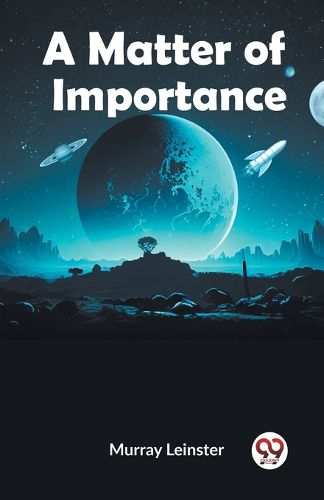Readings Newsletter
Become a Readings Member to make your shopping experience even easier.
Sign in or sign up for free!
You’re not far away from qualifying for FREE standard shipping within Australia
You’ve qualified for FREE standard shipping within Australia
The cart is loading…






This title is printed to order. This book may have been self-published. If so, we cannot guarantee the quality of the content. In the main most books will have gone through the editing process however some may not. We therefore suggest that you be aware of this before ordering this book. If in doubt check either the author or publisher’s details as we are unable to accept any returns unless they are faulty. Please contact us if you have any questions.
"A Matter of Importance" is a technology fiction short tale written by way of Murray Leinster, a prolific American creator recognised for his contributions to the style during the mid-20th century. This tale explores the consequences of a seemingly trivial discovery that turns out to have profound implications for humanity. The story revolves round Dr. Daniel Scott, a physicist who stumbles upon a weird phenomenon: a certain form of crystal, while struck, can emit a legitimate that causes all animals inside hearing variety to freeze of their tracks. This discovery, first of all brushed off as insignificant, soon becomes a count number of first-rate importance because the capability applications and ethical dilemmas surrounding it emerge. As the news of Dr. Scott's discovery spreads, diverse factions, including governments and navy companies, become inquisitive about harnessing the electricity of the crystal for his or her very own purposes. The story delves into the ethical and moral quandaries surrounding using such a era, in addition to the potential consequences for humanity if it falls into the incorrect fingers. "A Matter of Importance" is a notion-frightening exploration of the ethical issues that accompany clinical discoveries with great strength. It raises questions about the obligation of scientists, the role of governments in controlling new technologies, and the capability for unintended results.
$9.00 standard shipping within Australia
FREE standard shipping within Australia for orders over $100.00
Express & International shipping calculated at checkout
This title is printed to order. This book may have been self-published. If so, we cannot guarantee the quality of the content. In the main most books will have gone through the editing process however some may not. We therefore suggest that you be aware of this before ordering this book. If in doubt check either the author or publisher’s details as we are unable to accept any returns unless they are faulty. Please contact us if you have any questions.
"A Matter of Importance" is a technology fiction short tale written by way of Murray Leinster, a prolific American creator recognised for his contributions to the style during the mid-20th century. This tale explores the consequences of a seemingly trivial discovery that turns out to have profound implications for humanity. The story revolves round Dr. Daniel Scott, a physicist who stumbles upon a weird phenomenon: a certain form of crystal, while struck, can emit a legitimate that causes all animals inside hearing variety to freeze of their tracks. This discovery, first of all brushed off as insignificant, soon becomes a count number of first-rate importance because the capability applications and ethical dilemmas surrounding it emerge. As the news of Dr. Scott's discovery spreads, diverse factions, including governments and navy companies, become inquisitive about harnessing the electricity of the crystal for his or her very own purposes. The story delves into the ethical and moral quandaries surrounding using such a era, in addition to the potential consequences for humanity if it falls into the incorrect fingers. "A Matter of Importance" is a notion-frightening exploration of the ethical issues that accompany clinical discoveries with great strength. It raises questions about the obligation of scientists, the role of governments in controlling new technologies, and the capability for unintended results.